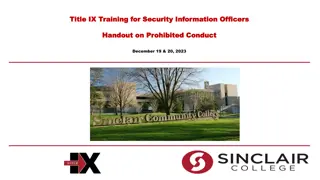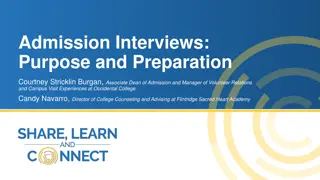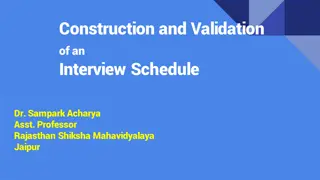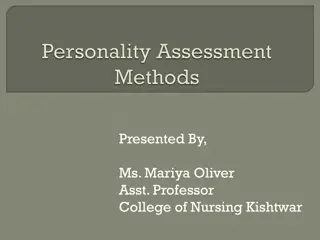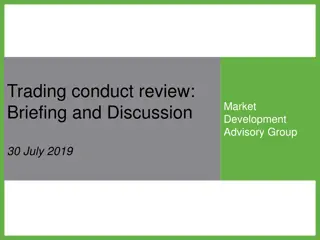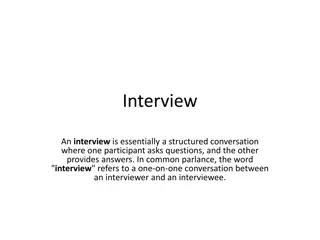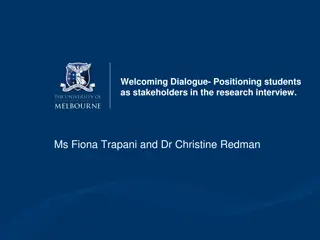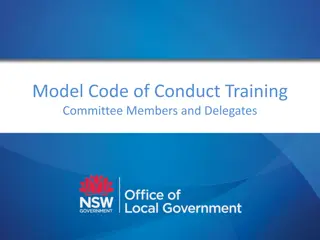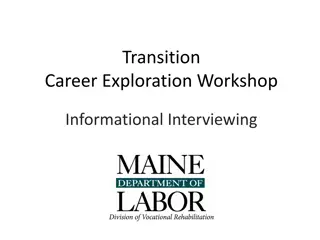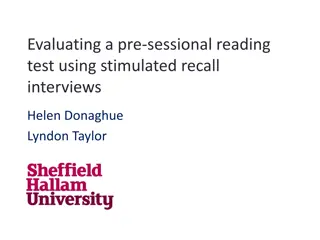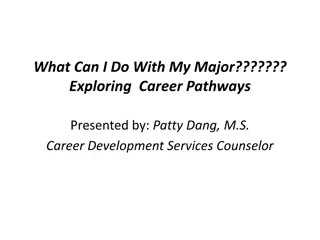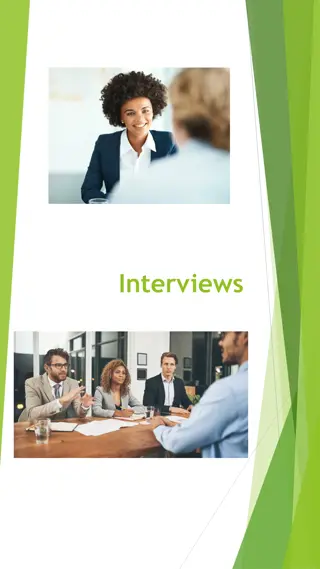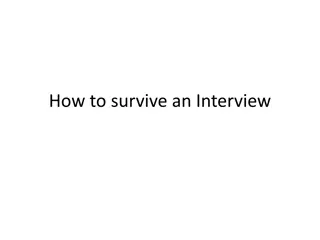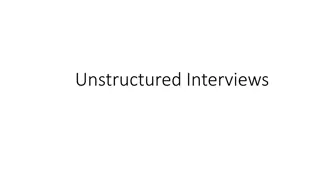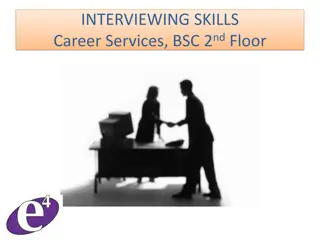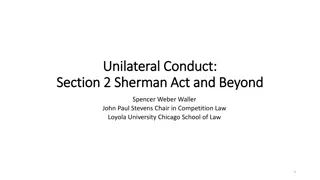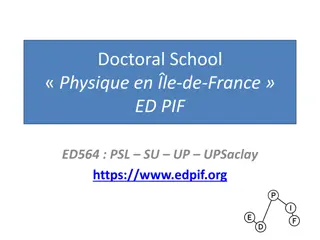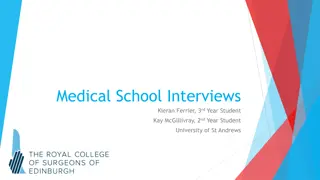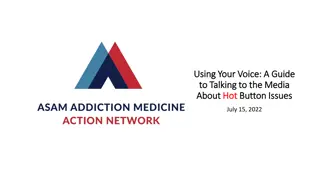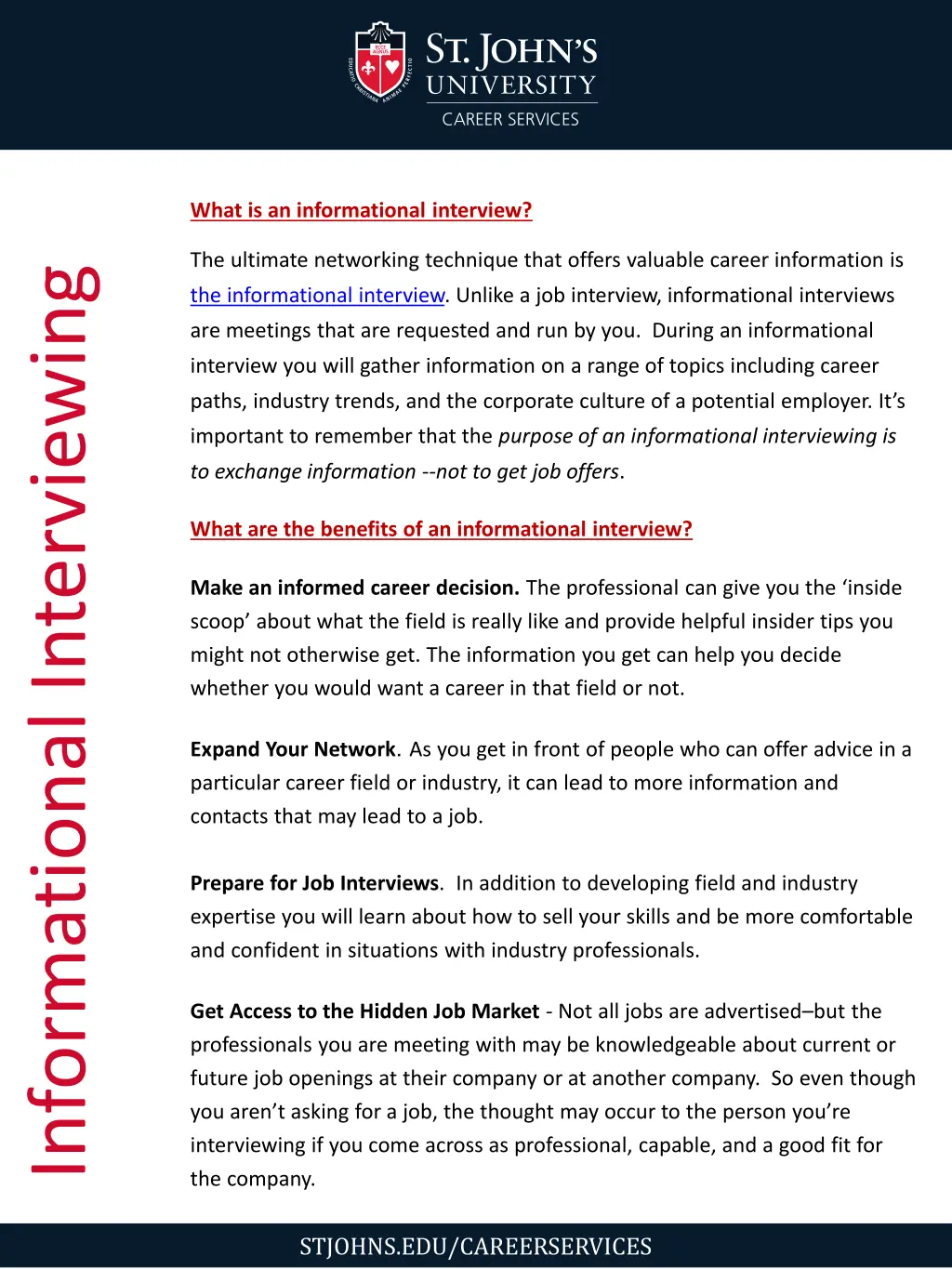
Master Informational Interviewing for Career Success
Learn how to conduct successful informational interviews to gain valuable career insights, expand your network, and uncover hidden job opportunities. Discover who to interview, where to conduct interviews, how to request them, and what questions to ask to make the most out of every meeting.
Uploaded on | 0 Views
Download Presentation

Please find below an Image/Link to download the presentation.
The content on the website is provided AS IS for your information and personal use only. It may not be sold, licensed, or shared on other websites without obtaining consent from the author. If you encounter any issues during the download, it is possible that the publisher has removed the file from their server.
You are allowed to download the files provided on this website for personal or commercial use, subject to the condition that they are used lawfully. All files are the property of their respective owners.
The content on the website is provided AS IS for your information and personal use only. It may not be sold, licensed, or shared on other websites without obtaining consent from the author.
E N D
Presentation Transcript
What is an informational interview? The ultimate networking technique that offers valuable career information is Informational Interviewing the informational interview. Unlike a job interview, informational interviews are meetings that are requested and run by you. During an informational interview you will gather information on a range of topics including career paths, industry trends, and the corporate culture of a potential employer. It s important to remember that the purpose of an informational interviewing is to exchange information --not to get job offers. What are the benefits of an informational interview? Make an informed career decision. The professional can give you the inside scoop about what the field is really like and provide helpful insider tips you might not otherwise get. The information you get can help you decide whether you would want a career in that field or not. Expand Your Network. As you get in front of people who can offer advice in a particular career field or industry, it can lead to more information and contacts that may lead to a job. Prepare for Job Interviews. In addition to developing field and industry expertise you will learn about how to sell your skills and be more comfortable and confident in situations with industry professionals. Get Access to the Hidden Job Market - Not all jobs are advertised but the professionals you are meeting with may be knowledgeable about current or future job openings at their company or at another company. So even though you aren t asking for a job, the thought may occur to the person you re interviewing if you come across as professional, capable, and a good fit for the company. STJOHNS.EDU/CAREERSERVICES
Who do I conduct an informational interview with? Informational interviews can be done with people in your network , people you are referred to thorough your network or by reaching out directly to employees in companies or careers you are interested in. A great tip is to start with people you know well. This can be family, friends, professors or former and current colleagues. You can also tap into fellow alumni by either searching on LinkedIn alumni or by joining the St. John s University Career LinkedIn page. Where do you conduct an informational interview? Ideally, you want to meet in person because a face-to-face meeting will give the interviewer the best chance to know you. Informational interviews can also be conducted through a 20-minute phone conversation, virtual, or by email through a question-and-answer exchange. It s a good idea to provide the person you would like to meet with a few options for meeting. How do I request and informational interview? You can request an informational interview via phone or email. Be sure to share your 30 second Elevator pitch and why you re interested in their company and/or why you want to meet that person. Dear Mr. Smith, I am a sophomore at St. John s University pursuing a BS in Finance with the goal of becoming a Financial Analyst. I located you on the St. John s University Career Connect group. I would like to schedule a 15-20 minute conversation to learn about your career in the finance industry and your experience at JP Morgan. My coursework and internship at Capital One provided me with a solid foundation and I am interested in your perspective on the opportunities I should consider to best position myself as a strong candidate with robust practical experience upon graduation. I look forward to our conversation. Sincerely, Michael
How do I prepare for an informational interview? Preparation for an informational interview is the same as preparation for an interview. Prior to the interview research the following: -Company (vision, mission, resource groups) -Industry -Profession -Person s background (research the person s LinkedIn profile or Bio under the company website) -Prepare elevator pitch Prepare questions What questions do I ask on an informational interview ? It is important to tailor each informational interview for the person you are meeting. You can use some of the following questions as a guide to get the most out of your informational interviews: 1. 2. 3. 4. 5. 6. What are your daily responsibilities? What do you like about your job? What do you dislike? How did you get to your current position? What are your future career aspirations? How can someone best prepare himself or herself for a career in XX Industry? What types of opportunities should someone look for as an initial internship or job in XX Industry? What are some of the trends occurring in your industry? Overall, how do you feel about quality of life? Are you able to balance work and family demands? 10. Can you recommend any other industry professionals for me to contact? If so, can I use your name in contacting the person, or would you be willing to set up a meeting? 7. 8. 9.
How do you conduct an informational interview? Like a job interview, your goal is to relax and be yourself. Focus on enjoying the opportunity to learn from someone who has great experience and is happy to share this experience with you. Below is an agenda for leading a 20-minute informational interview. Step 1: Great First Impression (2-3 minutes) Start with a sincere thank you for the person s time and expertise. If you were referred , briefly exchange pleasantries about how you came to know the same person. Then provide some background about yourself-your 30 second pitch. Be enthusiastic and articulate about your background and why you are excited to have the opportunity to speak with the person. Step 2: Agenda for Meeting (1 minute) Provide a brief overview of the topics you would like to cover. Step 3: Great Discussion (12-15 minutes) - Ask questions. Questions 1-3 Ask about person s career, job, company. Question 4: Is there anyone else I should speak to? This is a great question to expand your network. Keep in mind that when a person refers you to someone, his reputation is on the line. Question 5: How can I help you? Networking is about a mutually beneficial exchange. Offer to assist and if you are unsure how you can help, simply ask. Step 4: Great Ending (1 minute) - Recap what you and your contact will do; show gratitude. Step 5: Great Follow-up - Send a thank you within 24 hours to make sure the person knows how much you appreciated his time. Personalize your note by sharing what you learned from your conversation. Stay in touch every 6-8 weeks. Keep the person in the loop after you meet with one of his referrals or after you have the job. Remember that by meeting with you, the person invested in you, and it will be interesting for him to learn how his investment paid off. Informational interviews provide a wealth of invaluable career connections and information. More importantly you will gain invaluable experience honing your interview skills so that when a real job interview comes up, you ll be prepared to ace it.

